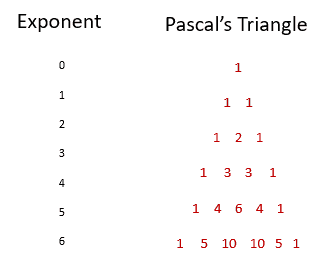Sometimes we end up with a quantity of the form $(1+x)^n$, that is, the quantity $(1+x)$ is raised to the nth power. This can be written as an infinite sum of terms known as expansion:
$(1+x)^n = 1 + nx +\dfrac{n(n-1)}{2} x^2 + ....$
This formula is useful for us mainly when $x$ is very small compared to one $(x \ll 1)$. In this case, each successive term is much smaller than the preceding term.
For example, let $x=0.01$, and $n=2$. Then whereas the first term equals 1, the second term is $nx=(2)(0.01)=0.02$, and the third term is $\dfrac{n(n-1)}{2} x^2 = \dfrac{(2)(1)}{2} (0.01)^2=0.0001$ and so on.
Thus, when $x$ is small, we can ignore all but the first two (or three) terms and can write:
$$(1+x)^n \approx 1+nx$$
This approximation often allows us to solve an equation easily that otherwise might be very difficult.
Some Series Expansions
$(1+x)^n = 1 + nx + \dfrac{n(n-1)}{2!} x^2 + ....\\$
$(a+b)^n = a^n + \dfrac{n}{1!} a^{n-1} b + \dfrac{n(n-1)}{2!} a^{n-2} b^2 + ....\\$
$e^x = 1 + x + \dfrac{x^2}{2!} + \dfrac{x^3}{3!} + ....\\$
$\ln (1 \pm x) = \pm x - \dfrac{1}{2} x^2 \pm \dfrac{1}{3} x^3 - ....$
For x in radians:
$\sin x = x - \dfrac{x^3}{3!} + \dfrac{x^5}{5!} - ....\\$
$\cos x = 1 - \dfrac{x^2}{2!} + \dfrac{x^4}{4!} - ....\\$
$\tan x = x + \dfrac{x^3}{3} + \dfrac{2x^5}{15} + .... \;\;\;\; |x| < \dfrac{\pi}{2}$
Some useful approximations
For $(x \ll 1)$:
$(1+x)^n \approx 1+nx$
$e^x \approx 1 + x$
$\ln (1 \pm x) \approx \pm x$
For $(x \leq 0.1 \;\mathrm{rad})$ [small-angle approximation]:
$\sin x \approx x$
$\cos x \approx 1$
$\tan x \approx x$
The small-angle approximation is excellent for $x<5^o=0.1 \;\mathrm{rad}$ and generally acceptable up to $x=10^o$.
So, let us evaluate $\sqrt{1.02}$:
$\sqrt{1.02}=(1.02)^{\frac{1}{2}}=(1+0.02)^{\frac{1}{2}} \approx 1+ \frac{1}{2} (0.02)=1.01 \;\;\;\;\;\;\;\;\;\;\; (x=0.02)$.
You can check that result with a calculator.

You don`t have permission to comment here!
Report